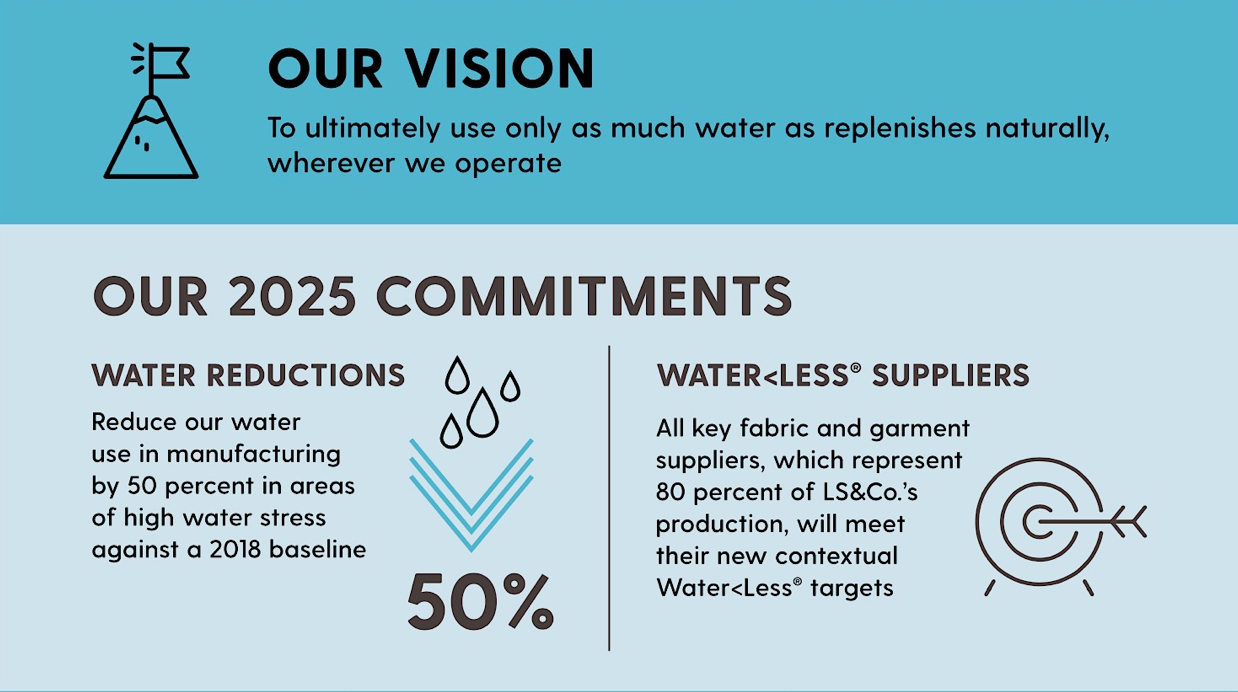As one of the world's leading apparel brands and a leading force for sustainable development, Levi Strauss & Co. is actively advocating and committed to enabling sustainability in supply chain.
We have set theScience-Based Target initiative (SBTi) approved greenhouse gas (GHG) emissions reduction targets, which not only cover owned and operated facilities, but also cover the suppliers of our global supply chain. Furthermore, Levi Strauss & Co. has committed to achieving the following target by 2025 (from 2016 base year):
- 90% absolute reduction in GHG emissions in all owned-and-operated facilities
- 100% renewable electricity in all owned -and -operated facilities
- 40% absolute reduction in GHG emissions across our global supply chain (Scope 3 Category 1 - purchased goods and services)
As part of our 2025 Water Action Strategy, Levi Strauss & Co. commits to reducing the amount of water used for manufacturing by 50% in areas of high-water stress by 2025 against a 2018 baseline. Consistent with the vision to use only as much water as replenishes naturally wherever we operate, Levi Strauss & Co.are committed to helping all key suppliers (including fabric mills), which represent 80% of production, to become distinguished Water<Less facilities by 2025.

In order to achieve these ambitious goals, we have accelerated our own technological innovations, such as the Water-Less technology, using the science and tools at our disposal to focus our emission and water reduction efforts in the most critical areas. Levi Strauss & Co. promotes these reduction targets through cooperation with suppliers and various stakeholders. To effectively achieve the goals, we have developed a clear roadmap and an annual action plan with our Chinese suppliers, including fabric mills, to further break down the targets for each supplier. Meanwhile, each key supplier in China has developed its own detailed roadmap with action plans to support the Levi Strauss & Co. 2025 Water and Climate Action Strategy.
We launched the Carbon Leadership Project (CLP) with our key suppliers (including five fabric mills and one laundry) in China in 2021 to help them to improve their internal capacity on carbon and water management. Levi Strauss & Co. plans to cover this Carbon Leadership Project for all suppliers in China from 2022.
Levi Strauss & Co. has carried out fruitful cooperation with the Institute of Public and Environmental Affairs (IPE) in China, which has been actively involved in the IPE Corporate Information Transparency Index (CITI) program in recent years. This covers five criteria: Responsiveness and Transparency, Compliance and Corrective Actions, Extend Green Supply Chain Practices, Energy Conservation and Emissions Reduction, and Promote Public Green Choice.
Leading the way on transparency, Levi Strauss & Co. has joined IPE Green Supply Chain Map since 2018, that links us with our suppliers’ environmental performance, not just suppliers’ names, but their real-time environmental performance data. There are total 120 suppliers including garments and wet processing suppliers on the IPE Green Supply Chain Map, representing over75 percent of our Supply Chain in China.
Levi Strauss & Co. not only uses the Green Supply Chain map to screen the China-based supplier’s environment performance, also encourages all our suppliers in China to register on Blue EcoChain. By registering under Blue EcoChain, our suppliers receive regular notifications alongside their stakeholders, in case they have any violation records. Thus, our suppliers ensure timely disclosures to all corrective actions.
Levi Strauss & Co. has achieved zero tolerance for environmental violations in the supply chain. All suppliers with environmental violations accept the IPE Green Choice Alliance (GCA) audit and take the GCA audit as an opportunity to effectively improve their own environmental management level.
Levi Strauss & Co. has encouraged suppliers to disclose more than 500 Pollutant Release and Transfer Register (PRTR) forms since 2016 and has covered 100% higher environmental impact suppliers, which cover the manufacturing sectors of fabric mills, garment factories, laundries, shoe factories, eyewear factories, etc., since 2018. In the process of PRTR data filling, suppliers are required to cross-compare the data of previous years in order to gain a full understanding of the annual changes in energy consumption data. Furthermore, Levi Strauss & Co. are passing on their ambition to suppliers, encouraging them to develop medium and short-term emission reduction targets in combination with national and industrial standards. A total 79 facilities have released their greenhouse gas emission data for 2019 on the IPE website; 70 facilities have done this for 2020. Among them, 26 companies with high environmental impact have set and released emission reduction targets.
As one of Levi Strauss & Co. strategy suppliers, Elevate Textiles Group is working with Levi Strauss & Co. to achieve their ambitious goal. They have set up a target of 2.5% carbon reduction year on year at a corporate level. Cone Denim is one of their key fabric mills located in China. They have disclosed Pollutant Release and Transfer Register (PRTR) data from 2013 and reported its emission data, including annual greenhouse gas emission data from 2015 through IPE. In line with the Group’s target, Cone Denim has also set a target of carbon reduction of 25% between 2016 and 2025 using PRTR as an effective tool for driving the progress. Cone Denim has not only been monitoring its own environment performance, but it has also monitored their upstream and downstream suppliers through Blue EcoChain. Under Cone Denim’s efforts in the past several years, they have kept all chemical suppliers ZERO IPE records; a total 4 chemical suppliers took corrective actions. Cone Denim has completed some energy conservation and emission reduction projects. For example: the air conditioner improvement project in 2019, which has reduced 1,745 mt CO2 per year.
Based on the energy consumption data, Levi Strauss & Co. have developed the target of energy conservation and emission reduction, ensured the effectiveness of energy conservation and emission reduction exertions, and further provided impetus for deepening green supply chain practice and improving brand value.
(The above content was provided to IPE by the brand, who is responsible for the accuracy of the data.)